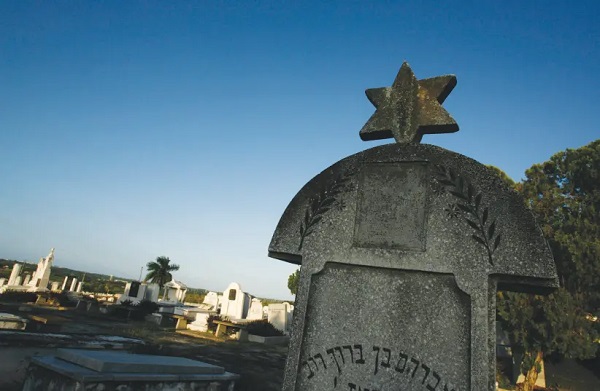Blog by Dr. Shimon Samuels published in The Jerusalem Post
8 August 2020
https://www.jpost.com/international/the-30th-anniversary-of-the-outbreak-of-the-gulf-war-a-cuban-perspective-637952
At the end of July, we were on a family vacation in Havana. We had flown from Mexico with a boisterous group of young Danish Communists on their way to cut sugar cane in the Marxist paradise.

A headstone with a Star of David stands at the Jewish cemetery in Guanabacoa near Havana,
Cuba, in 2007 (photo Claudia Daut/Reuters).
On August 2, 1990, Saddam Hussein invaded Kuwait. The Arab world was in pandemonium. Those in the Soviet fold supported Iraq. Others joined the Western coalition led by the United States.
Washington ordered Israel to stay out of the conflict, despite it eventually being subjected to 39 Scud missiles.
At the end of July, we were on a family vacation in Havana. We had flown from Mexico with a boisterous group of young Danish Communists on their way to cut sugar cane in the Marxist paradise.
The Joint Distribution Committee office in Paris had assisted in organizing a meeting with the Cuban Jewish leadership, led by its president, Dr. Jose Miller. The purpose was to gain access to State Archives on the MS St. Louis.
In May 1939, the German boat left Hamburg with 937 Jewish fugitives holding Cuban entry visas. On arrival, Havana took a pregnant woman and several illness cases, refusing to let the others land.
Appeals were made to Washington and Ottawa. Both refused.
The captain was ordered to return to Nazi Germany, but in the North Atlantic he threatened to scuttle the boat. His intervention resulted on the return to Europe with the placing of passengers in England, France, Belgium and the Netherlands. Those in England survived, many on the continent perished.
We were counting on Fidel Castro’s interest to reveal this outrageous behavior of Cuba’s pre-revolutionary government and of US State Department pre-War policy.
On visiting the library of the Patronato Jewish Community Center, we discovered a complete collection of Abraham Tkach’s out-of-print Yiddish collection. Tkach was my wife’s uncle. More apparent was the paucity of books in Hebrew.
Following the 1959 revolution, most Jews left the island illegally, many in refugee boats crossing the 60 miles to Florida. Those who remained due to family illness, age or mixed marriages, were – as was the case of all middle-class Cubans – divested of their property, but the synagogues remained open.
Following the Six Day War in 1967, the Soviet bloc, except for Cuba and Romania, broke diplomatic relations with Israel.
Much speculation was offered that Cuba maintained relations due to “Castro’s belief in his Marrano origins,” “a mark of independence to Moscow,” “a back channel to the United States,” or simply “valuable Israeli business and Israeli Foreign Office rural development assistance.”
In 1973, however, during the Yom Kippur War, Cuba broke relations during the Non-Aligned Movement meeting in Havana. Castro was applauded for sending a Cuban tank battalion to confront Israel on the Syrian front. In 1975, Cuba was a leader in promoting the “Zionism = Racism” resolution in the United Nations General Assembly.
From 1989 to 1991, the disintegration of the Soviet bloc, the fall of Communism and of the Soviet Union had Castro trying to avoid isolation and the subsequent economic crisis from the loss of Russian support. Once again, policy on Israel was softening.
A Jewish renewal was sparked by the visits of Jewish NGO leadership missions, principally through Canada.
Dr. Miller had cultivated contact with Castro. He told me that Fidel had asked to visit the Patronato. This provided an occasion for requests.
He asked, “What would you suggest?”
I replied, “To end the cartoons in the Communist Party newspaper, Granma, portraying Israeli soldiers in tanks with the faces of pigs. To explain to Fidel that this is antisemitic, as the pig is reviled across the Jewish world.”
The cartoons stopped.
I had then asked, “What could we do for you?”
Miller responded, “It is 25 years since I have seen my family in Miami.”
With the help of the Wiesenthal Center, under the guise of an inter-faith gathering, Dr. Miller was briefly united with them.
The Gulf War ended on February 28, 1991. Saddam is gone, as is Fidel. Cuba today is “Communism light,” yet ironically, it is one of the most hostile states to Israel on the international scene.
I was not granted access to the archives of the St. Louis. The issue became an initiative for Yad Vashem.
The return flight had the same group of young Danes, now sitting in cold silence.
“How was the sugar-cane?” I asked.
“They threw us out as ‘Trotskyites,’ because we told them we had visited Trotsky’s house in Mexico City on the way,” said the leader.
“So how do you feel?” I continued.
He answered, “Communism is dead.”